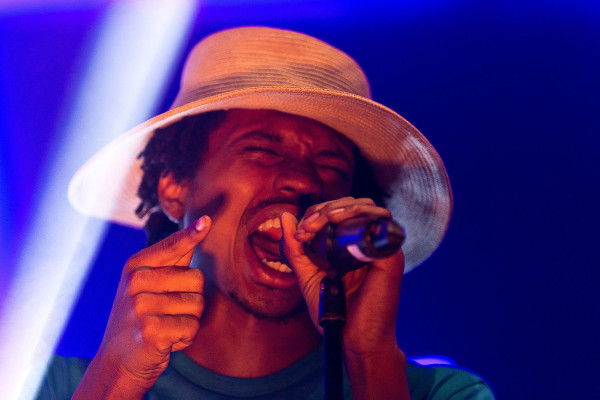
Raury is the Atlanta music scene’s self-declared indigo child, an adept vocalist and songwriter with sweeping messages of peace, love and armageddon delivered in saccharine lyrics and warm acoustic productions. He thinks and creates differently.
The 19-year-old’s debut studio album, “All We Need,” is a tangle of folk, hip-hop, R&B and electronic influences, and he rarely records a track without crossing some sort of sonic boundary. Musically, “All We Need” is a tour de force, as Raury demonstrates an impressive knack for varied songwriting while maintaining a distinct and enjoyable sound. But while his talents are big, his ambitions are bigger, and he often oversteps his means, trying desperately to convey something beyond his grasp.
His message is well-intentioned and thoughtful, but the flower child persona he painstakingly cultivates around it can be taxing. His casually rapped verses are especially unpolished, reminiscent of Jaden Smith in both their adolescent flow and forced attempts at depth. (“Forbidden knowledge can destroy mankind / We can grow out of control like cancer under the skin of Mother Nature / Busy cities much alike to a tumor / Too many cells, the residents, the body’s polluter.”)
Unfortunately, a lot of the supposed sophistication he injects comes off as contrived.
On “Trap Tears,” he repurposes a Nicki Minaj hook to gloomily repeat “Tears in the trap, tears in the trap” over an indulgent 808 beat with melodramatic layered synths. On the one hand, it’s a noble attempt to dismantle the commercialized glorification of Atlanta’s biggest and most tragic hip-hop export, but on the other hand, it’s incredibly on-the-nose and corny. Like a lot of young writers, he’s guilty of too much tell and not enough show.
This heavy-handedness contributes to a sense of self-importance that throws the whole project off-balance. It’s clear that he has some wisdom to share, but he has yet to master the art of subtlety.
On the opening track “Revolution,” he seemingly attempts to channel the doomsaying prophecies of the legendary hip-hop forefather Gil Scott-Heron, blithely rapping, “The insipid mothafucka called humanity / Raping and damaging everything in its way / Its daughter will be raised on McDonald’s and gasoline water / Each day now a battle for morals or dollars.”
It’s a big, confident message, but he fails to back it up with a sense of realness. Scott-Heron had credibility and a mature perspective when he radicalized his listeners — his music feels authentic, and his edifying rhetoric feels grounded in authority. Raury, on the other hand, comes off as a paranoid rebel child simply parroting the messages of his idols. That’s a fine approach to a Twitter feed, but it hardly makes for an artistic statement.
None of these shortcomings obscure Raury’s raw musical talent, however. Songs like “CPU,” featuring an unusually solemn but elegant verse from RZA, are beautifully rendered by tasteful instrumentals and Raury’s stellar, harmonic singing. “Kingdom Come” uses cheery brass and vocals to obscure much darker end-of-days lyrics, and demonstrates his impressive grasp of multi-layered instrumentation and songwriting.
https://www.youtube.com/watch?v=F9uh1LQv4gk
Raury recently performed his lead single, “Devil’s Whisper,” a forceful clap-along folk tune, on The Late Show with Stephen Colbert, coincidentally recording for the same show that featured an interview with Donald Trump. He seized the fateful opportunity (his first national television performance) to don a Mexican national soccer jersey with the presidential hopeful’s name conspicuously crossed out from the back. Like his music, this simple act has a plain message that can be appreciated at face value. This instance was more successful, however, because no subtlety was called for in the first place.
You can contact Benjamin Sorensen at bcsoren ‘at’ stanford.edu.
